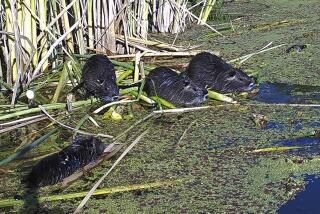Voracious African Snails, in State Illegally, Hunted
- Share via
WALNUT CREEK, Calif. — California officials are on the lookout for some particularly slimy characters, but they won’t be searching the usual dives and dark alleys.
They are on the trail of a snail that can grow as big as a fist, eats whole heads of lettuce in one sitting and makes garden plants quiver in their beds.
This is one investigation that is not moving at a snail’s pace.
“We would like to get them all back. They do reproduce very quickly and they will eat you out of house and home,” said state Department of Food and Agriculture spokeswoman Gera Curry.
The suspect in question is the giant African snail, a massive mollusk that grows to six inches, dwarfing its tamer cousin, the brown garden snail. The snail assails flowers, vegetables and even young rubber plants, in addition to its relish for lettuce.
They slipped into the country illegally last December and recently surfaced at a Contra Costa County pet shop, where they are believed to have been sold as exotics for terrariums.
“We’re still looking, we have inspectors going around to the various pet shops. We are relying very heavily on the civic-mindedness of the California public,” Curry said.
After the snails made the front page of the Contra Costa Times, about a half-dozen citizens had reported possible sightings of the pests to Contra Costa County Agriculture Commissioner Jack DeFremery.
Inspectors were checking out hot tips, he said.
“It’s a shift of priorities on a temporary basis until we can get on top of it,” DeFremery said.
The mollusk marauders came into the country via John F. Kennedy Airport in New York last December, where they slipped past customs under the shipping manifest of reptiles.
Agriculture officials realized they had a problem this spring when a Florida agriculture inspector found one of the big snails in a Tallahassee pet store.
The pests feed on virtually any plant. An infestation of a similar giant African snail in Florida in the 1970s took nearly six years to eradicate, California officials said.
From there, the hunt was on, with U.S. Department of Agriculture officials investigating pet stores in 27 states.
As of April, about 125 of the original 1,000-snail shipment had been captured, said USDA spokeswoman Roberta McCorkle. Several pet store owners, however, reported that the mollusks were unequal to the travails of travel and arrived DOA.
About 30 of the snails made it to California, most shipped to an unidentified pet store in Richmond, a Contra Costa County city on the northern shores of the San Francisco Bay.
Once captured, the snails will find themselves in hot water, boiling, to be exact.
More to Read
Sign up for Essential California
The most important California stories and recommendations in your inbox every morning.
You may occasionally receive promotional content from the Los Angeles Times.













